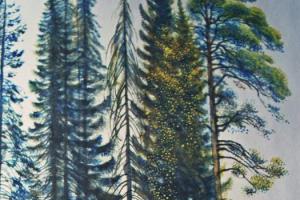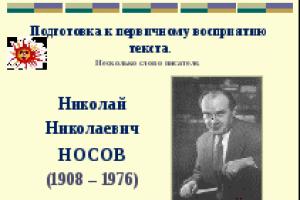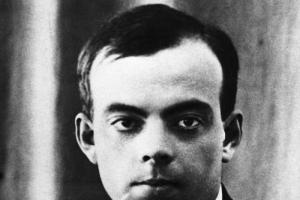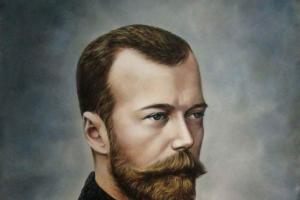The main character of Victor Astafiev's story “Vasyutkino Lake” is Vasya Shadrin, the son of a fisherman. His father, Grigory Afanasyevich, together with his team, fished on the Yenisei. Sometimes fishermen had to swim far from home to get a good catch. On one of these trips to the lower reaches of the Yenisei, the whole family went with Grigory Afanasyevich: his wife, son Vasyutka and father, an old fisherman, grandfather Afanasy.
In one of the places, the fishermen decided to land on the shore and organize a parking lot. In this place, an old hut has been preserved, in which the entire brigade settled. Vasyutka did not sit idle, he began to go into the taiga for pine nuts, which fishermen loved to crack in the evenings.
One day, at the very end of summer, Vasyutka, as usual, went for nuts. He took with him a gun and a piece of bread. Previously, he had never come across serious game in the taiga, but this time the boy, who had already picked up a bag of nuts, came across a large wood grouse. Vasyutka managed to wound the bird, and he rushed after it. When the capercaillie weakened, Vasyutka shot again and killed the bird.
He rejoiced at his success and was already looking forward to returning home with the captured wood grouse when he realized that he was lost. Usually he navigated the taiga by notches on the trees, but in pursuit of a wounded bird he deviated far from his usual routes and could not find the familiar notches.
Vasyutka wandered around the taiga for a long time. He had matches, a gun and some salt with him, so the boy was not in danger of hunger and cold. The most important thing for him was to go to the Yenisei.
One day he came across a small lake in the taiga and was surprised to find that there were a lot of large fish in it. Vasyutka began to think where the commercial fish could have come from in the lake, and remembered that this happens when the lake is flowing and a river flows out of it. If so, the river could lead him to the Yenisei.
The boy began to look for the river and discovered that the small lake was connected to a much larger lake, which also had a lot of fish. Based on indirect evidence, Vasyutka determined that there was a current in the lake. Soon he found a river flowing from the lake.
Walking along the river bank, Vasyutka managed to reach the Yenisei, where fishermen picked him up. From them he learned that the camp of his father’s brigade was sixty kilometers upstream. The fishermen brought the boy to his parents, to whom he told about his wanderings and about a large lake rich in fish.
A few days later, Vasyutka’s father and his team reached this lake and made sure that it was really profitable to fish there. And the fishermen nicknamed the lake Vasyutkin. This is how it has been marked on maps ever since.
This is the summary of the story.
The main idea of Astafiev’s story “Vasyutkino Lake” is that in critical situations one should not panic, one must calmly and calmly look for ways to salvation. Vasyutka, lost in the taiga, was not at a loss. He warmed himself by the fire, hunted birds, ate pine nuts and looked for a way to the Yenisei. The flowing lake discovered by the boy helped the boy get out of the taiga and return home.
The story teaches you to be attentive and observant. Only Vasyutka’s observation skills allowed him to find a lake in the taiga, and this discovery saved his life.
In the story, I liked the main character, the boy Vasyutka, who not only survived alone in the taiga, but also found a lake rich in fish.
What proverbs fit Astafiev’s story “Vasyutkino Lake”?
The taiga is like the sea; whoever doesn’t know it, woe to him.
The animal runs towards the catcher.
Who seeks will always find.
Luck is the companion of the brave.
In 1952, Astafyev wrote “Vasyutkino Lake”. You will learn a summary of this story from this article. The work begins with a description of the lake. It was named after one boy, Vasyutka, who found it and showed it to people.
Bad news
Vasyutka lived in the taiga with his father and mother in the summer. His father was the head of a local fishing crew. Things weren't going well for the men. Frequent autumn rains swollen the river, and the fish stopped being caught. The men walked gloomily, they were languishing from forced idleness. The brigade decided to go downstream of the Yenisei. However, the catches remained meager.
Fishermen go to the Yenisei
The fishermen stopped in the lower reaches of the Yenisei in a hut that was built by a scientific expedition several years ago. The days began, similar to each other. The boy was bored. He had nowhere to go and no one to play with. He was looking forward to the start of the school year. In the evenings it was a little more fun. The fishermen all gathered together in the hut, smoked, had dinner, told stories from life and fables, and cracked the nuts that Vasyutka supplied the fishermen with. The boy had already chopped all the cedars located nearby, and each time he climbed further and further. However, this work was not a burden to him.

Vasyutka goes for nuts
Vasyutka, having had breakfast, again got ready to go into the forest for nuts. His mother told him displeasedly that he should prepare for his studies instead of wandering through the forest. Then she reminded Vasyutka not to go far, and asked if he had taken bread with him on the road. The boy said that he didn't need bread. However, his mother still gave him a piece of paper, saying that it had been this way “since time immemorial,” and Vasyutka was still too young to change the “taiga laws.” The boy decided not to argue and disappeared into the forest. He walked, whistling cheerfully and paying attention to the marks on the trees. In the end, he spotted a suitable cedar and decided to climb it. Then Vasyutka began to kick the branches with his feet. Cones fell. Vasyutka got down, collected his booty in a bag, and then decided to chop another cedar, which he had chosen.
Meeting with a wood grouse
Suddenly something clapped loudly in front of the main character, whom Astafiev created (“Vasyutkino Lake”). He shuddered in surprise and suddenly saw a capercaillie in front of him - a large black bird. The boy's heart sank. He had never managed to shoot a wood grouse.
The bird flew across the clearing and ended up on dry land. It was difficult to get close to her. Vasyutka remembered how the hunters said that the capercaillie should be taken with a dog. The bird looks at her, bursting into barking, and meanwhile the hunter approaches from the rear and shoots.
Vasyutka cursed himself for going into the forest without Druzhka. He fell on all fours and, imitating a dog, yelped and then carefully began to move forward. The boy did not notice that he had torn his padded jacket and scratched his face. He was filled with excitement. The bird froze and watched him with curiosity.
Chasing a bird
The boy, choosing the moment, rose to one knee, deciding to catch a capercaillie at gunpoint. When the trembling in his hands subsided, he fired. Flapping its wings, the bird fell down. However, without touching the ground, the wood grouse straightened up and flew somewhere deep into the forest. The boy rushed after the wounded bird.

The capercaillie grew weaker and weaker. Soon he ran, as he could no longer take off. It was not far from the bird. The boy caught up with the wood grouse in a few leaps and fell on his stomach. Vasyutka, smiling joyfully, stroked the bird, admiring its feathers, black with a bluish tint. The boy weighed the prey in his hand and realized that it was time to go home.
Vasyutka got lost
He walked proud of his luck and happy. However, Vasyutka soon realized that he was lost. He looked around in search of clutter and turned back, looking closely at each tree. However, there were no marks on them.
Finding the way
The boy's heart sank. In order to drive away fear, he began to reason out loud, convincing himself that he would certainly find the way. However, fear approached him more and more. Vasyutka again began to think out loud about the need to go south. He advanced, but no obstacles were visible. Several times the boy changed direction. He poured the cones out of the bag and walked forward until he realized with all clarity that he was lost.

Many times the boy heard stories about people wandering in the forest. However, he imagined it somehow differently. It all turned out too simply. Vasyutka was overcome by despair.
At night he stopped and fried a wood grouse, but decided to save the bread for an emergency. Waking up, he climbed a tall tree to understand where the Yenisei was, but did not find a yellow strip of larch surrounding the river. Having filled his pockets with nuts, the boy set off. It’s interesting how the story “Vasyutkino Lake” will end, isn’t it? Don't worry, it has a happy ending. Very soon you will find out what ending the author of the work “Vasyutkino Lake” has prepared for readers. You can leave your review of it, as well as your opinion about the main characters, in the comments.
Vasyutka discovers a lake

In the evening Vasyutka went out to a large lake full of unafraid game and fish. Here he shot ducks and settled down for the night. The boy was very scared and sad. Remembering school, he repented of being a hooligan, smoking, and not listening in class. Taking a closer look at the fish in the morning, he realized that it was a river fish, which means that a river must flow out of the lake.
In the afternoon the boy climbed a fir tree, ate a piece of bread and dozed off. He woke up at sunset. It was still raining. Vasyutka lit a fire, and then heard the whistle of the steamer - somewhere nearby was the Yenisei. He got out to the river the next day. While he was wondering which way to go, a passenger ship sailed past him. Vasyutka shouted and waved his arms in vain - he was mistaken for a local resident.
Rescue of the main character and a well-deserved reward
What does Astafiev talk about next ("Vasyutkino Lake")? Let's move on to the description of the finale. The boy settled down for the night. In the morning he heard the sound of a fish-collecting boat. The boy started screaming, lit a big fire, and was noticed. Kolyada, a guy he knew, took him to his relatives, who had been looking for him for the 5th day in the taiga.
After 2 days, the boy took the fishing crew to a place that was called Vasyutkino Lake. The summary does not describe the details of the ending. Let us only note that there were a lot of fish in the reservoir. “Vasyutkino Lake” soon appeared on the regional map. Already without an inscription, it migrated to the regional one, and only the boy who discovered it could find it on the map of the country. This is how the work that Astafiev created (“Vasyutkino Lake”) ends. Let's now talk about the main characters.
Nature in the story

Nature and man (Vasyutka) are the main characters. "Vasyutkino Lake" is a story in which nature is not just a background or decoration. This is a separate world that lives by its own laws. He tests the essence of people and determines what a person is capable of. Nature forces the main character to undergo trials and makes it possible to better appreciate the care and love of his mother, loved ones, and family. It threatens, confuses, frightens, but it also lifts the curtains and suggests. You just need to understand, see, notice, and for this you should be sensitive and vigilant not only with your ears and eyes, but also in your heart.
Boy Vasyutka from the story "Vasyutkino Lake"

The summary you just read does not allow us to describe in detail the character of this boy. However, you can get a general idea about it. Human essence, as we know, is best revealed in extreme situations. This is the main idea of the story written by Viktor Astafiev. Vasyutka ended up in one of them. And he was able to show courage, resourcefulness, and determination. Of course, the boy was very scared, realizing what it meant to get lost in the forest. However, nature does not like the cowardly and weak, and Vasyutka was well aware of this. Of course, he had been in the forest many times and knew from the stories of fishermen what to do in such situations. At the same time, Vasyutka understood how easy it was to disappear forever in the vastness of the harsh taiga. Therefore, he needed all his will, courage and self-control in order not to succumb to panic. Victor Astafiev notes that Vasyutka, like an experienced adult, thought through every step, every action, settling down for the night, choosing a direction, getting food. Thanks to his courage, he emerged victorious from the forest. His victory was that he overcame fear and confusion, and this helped Vasyutka return home. He passed the test, and the reward was a lake full of fish, which the boy told the fishermen about.
Isn’t it true that Astafiev told us an interesting story (“Vasyutkino Lake”)? The main characters are only one side of the analysis of this work. You can continue to think about it, which is what we encourage the reader to do.
The story of how to not get confused in a critical situation, succumb to panic, and, having mobilized your strength, to do everything that depends on you, is told in his work “Vasyutkino Lake” by V. P. Astafiev.
The plot of the story is taken from the childhood of the writer, who spent his student years in the Krasnoyarsk region. Even the foreman's surname is real and belongs to a famous dynasty of Siberian fishermen.
History of creation
“Vasyutkino Lake” was written in 1952, and published in 1956. But the story began to appear in the year when fifth-grader Vitya, fulfilling an assignment from a literature teacher, told in an essay dedicated to the past summer about how he got lost in the taiga , spent many anxious days alone with nature, discovered a lake unknown to the old-timers and, in the end, was able to get out to the river on his own. A vivid and truthful retelling of the boy's experiences led to his work being published in the school magazine.
The children's essay, created from memory, became the basis for the writer.
Description of the story

In simple but figurative language, the narrator tells about the everyday life of a fishing camp in Siberia. Thirteen-year-old Vasyutka, the son of a foreman, tries to help the adults to the best of his ability, getting pine nuts for them.
One day, having grabbed a gun and provisions, the boy went further into the forest, hoping for a rich harvest, and got lost. After futile attempts to find the way, Vasyutka realizes that there is nowhere to wait for help, she must rely only on herself. Horror, panic and confusion gradually give way to calm prudence. It was not for nothing that the guy grew up in this harsh region, from an early age hearing the instructions of old people on how to behave in such a case. Using the advice of experienced hunters and his own skills, the boy manages not only to survive in harsh conditions for several days, overcoming fear, but also to get food for himself, warm up, discover a lost reservoir with valuable fish, and, remembering his geography lessons, go to the shore of the Yenisei, to people.

The schoolboy walked sixty kilometers in five long days, full of uncertainty and anxiety. Knowing that the fishermen had been pining for a long time without a catch, Vasyutka, having arrived home, immediately reported about the lake he had seen. Having shown the brigade the cherished route, the teenager feels involved in a common cause. Subsequently, the reservoir was mapped and named after Vasily.
Main character

Vasily Shadrin is an ordinary village schoolboy, a mischief maker and a braggart. He loves adventures and considers himself quite an adult and independent person. His character was formed under the influence of his father, the taciturn inhabitants of the taiga village. The customs and traditions of the Siberian region also left their mark. The author does not give a detailed description of the main character; his personality is revealed during the narration.
Finding himself in a hopeless, frightening situation, knowing what the loss of the road in the forest could result in, clearly imagining the consequences, Vasyutka showed courage and restraint, practical intelligence and prudence, without losing his sense of humor. Not giving in to fear, bravely overcoming obstacles, the boy thinks not only about himself, but also about common interests.
Story Analysis
In the introduction, told in third person, the author talks about the new lake and the role of Vasyutka in this discovery. Deep love for the homeland and the conviction that large and small victories await each of us comes through in the opening lines.
The plot begins when, carried away by the hunt for wood grouse, the teenager gets lost. The climax is the moment when the taiga inhabitants rescue the desperate Vasyutka. The denouement of the story is the boy's return to his mother and the beginning of fishing in an open lake.

The narrator uses traditional composition with a sequential narrative and a minimum number of characters. The leisurely and detailed presentation allows you to imagine yourself in the place of the central character, the reader sympathizes with Vasya and worries about him.
Astafiev is characterized by the use of comparisons. Thanks to colorful descriptions, the nature of the lower Yenisei comes to life. The use of the local dialect in direct speech adds imagery to the characters.
Overcoming difficulties, always looking for a way out of a difficult situation, using all opportunities - this is what this story teaches. A great desire to live helped the little Siberian get out of the taiga.
Valieva Regina Ivanovna
MBOU "School No. 174" Sovetsky district of Kazan
Teacher of Russian language and literature
Literature lesson summary on the topic:
“Creativity of V.P. Astafiev. The story “Vasyutkino Lake”: the formation of the character of the main character"
5th grade (according to T.F. Kurdyumova’s program)
Goals:
1. Cognitive and educational :
Start studying the biography of V.P. Astafiev, the story “Vasyutkino Lake”, to interest the work of V.P. Astafieva; continue to develop the ability to conduct an educational dialogue, highlight the main idea, and answer questions.
2 . Educational:
Continue to develop the ability to compare, generalize, and the ability to find confirmation of your statements in the text.
3. Educational:
Cultivate interest in the work of V.P. Astafiev; to promote the development of moral qualities in schoolchildren and an active life position.
Lesson type: lesson-conversation
Equipment: photographs by Viktor Astafiev, text of the story “Vasyutkino Lake”.
During the classes:
I. Teacher's opening speech:
Hello guys. Today we are starting to study the work of Viktor Petrovich Astafiev(his last name and date of birth and death are written on the board). Does this name sound familiar to you? In elementary school, you already read his stories “The Haircut Squeak” and “Kapalukha.”
And today we will get acquainted with the biography of Astafiev and talk about another of his stories, which is called “Vasyutkino Lake”.
I'll start the story with the words of the critic Al. Mikhailova about the writer: “...I would like to say that he... experienced and suffered a lot before he tried to talk about what he experienced and saw.”(also written on the board).
“I was born and grew up in a Siberian village on the banks of the majestic and for me the most beautiful river in the world - the Yenisei,” said Astafiev.
I show photographs of Astafiev near the Yenisei River.
- Look, guys, where is the writer depicted? (on the river bank). –Right! This river is called the Yenisei. This is exactly what the writer talks about so enthusiastically.
- What does this mean?( that he loved nature).
- It’s true, he wrote this: “I love my land and never tire of being amazed at its beauty, inexhaustible patience and kindness... Having lost my mother early - she drowned in the Yenisei in the spring of 1932, I naturally gravitated towards my second and unchanging mother, the earth. And life provided me with a constant opportunity to be outdoors and with nature.”
- What can we say about him? What is his look, facial expression? (He has kind, sincere eyes, a pleasant facial expression). –That's right, guys. I think so too. When I look at his photographs, I see a kind, sincere man who loves nature with all his soul.
Viktor Petrovich Astafiev is an extremely sincere and truthful writer. He was born on May 1, 1924 in Siberia, on the Yenisei, in a village in the Krasnoyarsk Territory. Astafiev’s childhood and adolescence were difficult. The boy was 7 years old when his mother Lydia Ilyinichna drowned in the Yenisei. The boy was taken in by his grandparents. When his father and stepmother moved to Igarka, Astafiev ran away from home, became a street child, and was brought up in an orphanage. He changed many professions: mechanic, loader, foundry worker, watchman, journalist. He was at the front for three years, where he was seriously wounded. After the war, he settled in the Urals, changed many professions and in 1951 became an employee of the Chusovoy Rabochiy newspaper, began writing and publishing his own stories, then novellas and novels. The first collection of stories, “Until Next Spring,” was published in 1953.
- What do you guys think, why did Astafiev start writing? How do you understand the words: “...I know one thing for sure - they forced me to write books and life”?
(Astafiev was forced to write by his difficult life and love of books).
-
Right! Here's what the writer himself said:
“...I thought and thought, and it turned out that I needed to talk about my fellow countrymen, first of all about my fellow villagers, about my grandparents and other relatives... They were interesting to me and loved by me for who they are on really"(V.P. Astafiev)
.
Astafiev's works are based on the story of his own life. Many of the writer’s books are dedicated to childhood. The future writer lived in unity with nature and rural life. The boy was fishing, and the lake accepted him, but Astafiev’s fishing days ended, he ended up in an orphanage, where he wanted to talk about the lake, “to open it as he had once seen it, so that what was written would not be felt at all, and the reader’s soul would melt and shiver if only his skin, and from delight, from love, he would want to kiss... every tree in the forest, every leaf... And he would be happy that there is a beautiful world around him, and he is in this world.. ."
Viktor Petrovich left memories of the creation of the work that you are about to get acquainted with: “The fate of the story “Vasyutkino Lake” is curious. In the city of Igarka, Ignatiy Dmitrievich Rozhdestvensky, a later famous Siberian poet, once taught Russian language and literature. He taught, as I now understand, his subjects well, he forced us to “use our brains” and not lick expositions from textbooks, but write essays on free topics. This is how he once suggested that we, fifth graders, write about how the summer went. And in the summer I got lost in the taiga, spent many days alone, and I wrote about all this. My essay was published in a handwritten school magazine called “Alive.” Many years later I remembered it and tried to recall it in my memory. And so it turned out “Vasyutkino Lake” - my first story for children.”
For home, I asked you to read the story “Vasyutkino Lake” on your own. Has everyone read it?
II . Conversation on questions:
How did the story make you feel?
Who is the hero of the story?(The hero of the story is the boy Vasyutka, 13 years old)
Why is Vasyutka bored in the fishing brigade?(Vasyutka got bored in the fishing brigade because the days were monotonous, he only found calm fishing, and he had no one to play with)
What time of year was it? Search the text and read. (It was the end of August. At the beginning of the story it talks about frequent autumn rains, and then we read: “the August night is short”).
Why did Vasyutka go into the forest?(Vasyutka went into the forest to get nuts for the fishermen)
What did you take with you?(He took food, matches, a gun with him)
Why did mom insist that Vasyutka take a piece of bread with him?(This is the old order: go to the forest, take food, take matches)
When did Vasyutka realize that he was lost?(Vasyutka realized that he was lost when he lost sight of the trees)
How did the author manage to convey his emotional state? Read this description.(The stupor lasted until Vasyutka heard some mysterious rustling in the depths of the darkened forest. He screamed and started running. How many times he stumbled, fell, got up and ran again, Vasyutka did not know. Finally he jumped into windbreak and began to crash through the dry, thorny branches. Then he fell from Valezhin face down into the damp moss and froze. Despair overwhelmed him, and he immediately lost his strength. “Come what may,” he thought detachedly. Night flew into the forest silently, like an owl. And with it comes the cold. Vasyutka felt his sweat-soaked clothes getting cold."
Are there any words in this description that you guys don't understand? Windfall - trees broken by the wind. Deadwood is with eared trees lying on the ground.
Why does the author describe Vasyutka’s condition in this way?(The author describes Vasyutka’s state in this way in order to show his tension, anxiety, initial despair and panic).
What did Vasyutka remember when he realized that he was lost?(When Vasyutka realized that he was lost, he immediately remembered the words of his grandfather and father: “Taiga, our nurse, does not like flimsy people.”)
Why did he remember these particular words?? (Vasyutka remembered these words because he felt defenseless)
How many days did Vasyutka search for his way home? (Vasyutka looked for the way home for 4 days, on the 5th day he was found)
Now, guys, let's create a table with you that will look like this:
III. Compiling a table
Day
Vasyutka's condition and behavior
Day 1
-What can you say about Vasyutka after reading a detailed description of his first day (night) in the taiga? (we work according to the text)
Numbness; froze, despair overwhelmed him, and he immediately lost his strength; cold; smiled through force: “We live!”; loneliness; but as soon as I lay down and thought, anxiety began to overcome me with renewed vigor; and yet it was creepy.
Day 2
-And now let’s find in the text a description of the Siberian taiga.
“Taiga... Taiga... She stretched endlessly in all directions, silent, indifferent. From above it seemed like a huge dark sea. The sky did not end immediately, as it happens in the mountains, but stretched far, far away, pressing closer and closer to the tops of the forest.<…>For a long time Vasyutka looked with his eyes for a yellow strip of larch among the motionless green sea (a larch forest usually stretches along the banks of a river), but all around there was dark coniferous forest. Apparently, the Yenisei, too, was lost in the remote, gloomy taiga. Vasyutka felt small and small and cried out with anguish and despair...”
Increasing loneliness; yearning; despair.
-How does Vasyutka behave?
The hands were doing their job, and the question was being solved in the head, one single question: “Where to go?”; “Vasyutka correctly judged where to go: to the south the taiga stretches for thousands of kilometers, you will get completely lost in it. And if you go north, then after a hundred kilometers the forest will end and the tundra will begin. Vasyutka understood that going out into the tundra was not salvation. Settlements there are very rare. But at least he can get out of the forest, which blocks the light and oppresses with its gloominess”;
“I made my way forward with a bang.”
-At what point did he cry? Find this description.
Found a lake - “Vasyutka’s lips trembled:<Нет, неправда!>; then he sat down, with a tired movement took off the bag, began to wipe his face with his cap, and suddenly, clinging to it with his teeth, he burst into tears.
- Why did the boy cry?
The boy burst into tears because his expectations were not met. Instead of the Yenisei, he found an unknown lake. He felt offended.
-Compare the forest and lake life of Vasyutka. What did he like best and why?
“Still, it was much more fun by the lake than in the thick of the taiga.” The taiga is dark, gloomy.
-What was the boy thinking on the second night?
The boy thought first about home, and then he remembered school and his comrades.
-Why does he remember all this? Is it only “to drive away bad thoughts”?
“He felt sorry for himself, remorse began to pester him” - he begins to realize the feeling of his guilt, remembering his mistakes and bad behavior. “Vasyutka felt absolutely bitter”
Day 3
-What happens to the boy on the 3rd day?
He tries not to rush into thoughts: “No, it’s better not to think. Yesterday the Yenisei, the Yenisei, was happy, and saw a swamp shish. No, it’s better not to think.” He saw that the lake was big, full of white fish, he wanted to get out, tell everyone, he encouraged himself: “What? And I’ll go out!”
“He even began to feel feverish (the lake is flowing), and it was both joyful and somehow scary to believe in it.”
I saw a healthy wood grouse, but did not chase him anymore; I saw a yellow strip of deciduous forest - excitement.
Rain: Vasyutka curled up and fell into a heavy sleep.
Which day, in your opinion, turned out to be the most difficult for Vasyutka: the day when he got lost, or the day when it started to rain (i.e. the 3rd day)?
The most difficult day was when the wind rose and it started to rain. The boy was hungry and began to feel sick. He ate the remains of the crust. There was no strength even to make a fire. The boy's strength was running out.
Day 4
-By what signs did Vasyutka find his way to the Yenisei?
At first Vasyutka guessed that the lake was flowing. If the lake is flowing, it means it flows into a large river.
-Why was it so important for him to go to the Siberian river?
Because boats and steamships are sailing along the river, there is hope that someone will see him and save him.
-How does the author describe the meeting with the Yenisei? “The boy froze. It even took his breath away - his native river was so beautiful, so wide! And before, for some reason, she seemed ordinary to him and not very friendly. He rushed forward, fell on the edge of the bank and began to grab the water with greedy gulps, slap his hands on it, and plunge his face into it...<…>Vasyutka went completely crazy with joy. He started jumping and throwing up handfuls of sand.”
- Why was the last night on the shore especially alarming?
The last night on the shore was especially alarming, because it seemed to the boy that someone was swimming along the Yenisei. First he heard the slap of oars, then the knock of engines. Vasyutka was afraid that he would not be noticed.
-How did the boy achieve his salvation?
The boy lit a fire and guessed that he would be noticed more quickly by the fire. Then he remembered the gun and started firing.
-What does this mean?
All this speaks of his perseverance and desire to be saved at all costs.
Day 5
- How does Vasyutka behave at home?
“Vasyutka lies on the trestle bed, exhausted...”; “I timidly watched my father.”
- Why does the boy behave this way?
Vasyutka has finally returned home, he is watching his mother and grandfather, waiting for what his father will tell him, whether he will scold him.
-How did grandfather, mother and father meet Vasyutka?
Grandfather, mother and father greeted Vasyutka joyfully, unexpectedly, they thought that he had not survived.
-Why didn’t anyone scold him?
Nobody scolded him, because his family no longer hoped to see him alive. Vasyutka has already suffered a lot. The main thing is that he was found and saved his life.
Is Vasyutka’s condition and behavior different on each day? Compare.
(Different. At first he tried not to cry, there was fear and despair in his soul, but he decisively moved forward, encouraging himself. The only turning point was when, instead of the Yenisei, he saw an unfamiliar lake. He cried out of resentment. The further he goes, the more confident he feels)
Compare in the table how the tests along his path change in degree of difficulty?
(Every day the tests on Vasyutka’s path become more and more difficult)
What does this mean?
(This suggests that despite increasingly difficult trials, Vasyutka finds the strength to save himself, he does not give up)
What qualities helped him?
(Vasyutka was helped by courage, patience, love of nature, knowledge of nature, resourcefulness)
So what do you think was the main thing in the story? Based on what we just talked about.
(In the story “Vasyutkino Lake” the author wanted to show that difficult life trials will help to overcome such character qualities as courage, patience, resourcefulness, knowledge of nature, love for it. “The Taiga does not like the flimsy.” In the story we see how a personality develops , man begins).
Very true thoughts, guys. Let's write them down.
Today's assessments are being received...
And your homework will be like this:
Draw an illustration for one of the suggested episodes:
Wood grouse hunting
First night in the taiga
Meeting with a forest lake
Finally the Yenisei!
Vasyutka at home
Thank you everyone for your work in class. Goodbye.








